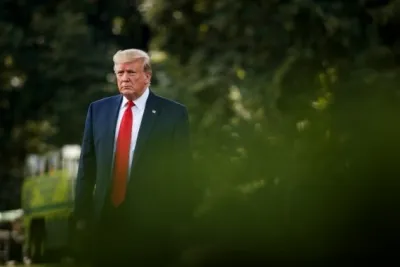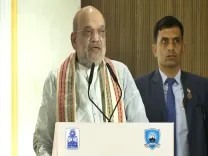Did a US Court Just Block Trump's 'Liberation Day' Tariffs?

Synopsis
Key Takeaways
- Federal court ruled against Trump's tariffs.
- Authority over trade policy is with Congress.
- Implications for ongoing trade negotiations.
- Legal battles surrounding tariffs are not over.
- Significant impact on small businesses reliant on imports.
Washington, May 29 (NationPress) In a major legal blow to US President Donald Trump, a federal trade court has overturned his proposed 'Liberation Day' import tariffs, asserting that he exceeded his constitutional powers.
The three-judge panel at the Court of International Trade in Manhattan ruled on Wednesday (US time) that Trump's sweeping duties on nations with trade surpluses against the US breached the authority granted to the presidency under the International Emergency Economic Powers Act (IEEPA), as per local media reports.
The Trump administration defended the tariffs by citing the IEEPA, a law designed to address "unusual and extraordinary" threats during national emergencies.
Officials argued that Trump's measures were vital to tackle a national threat posed by trade imbalances, particularly with countries like China and the European Union.
They cautioned the court that halting the tariffs could undermine ongoing trade negotiations with China and might reignite tensions between India and Pakistan.
In legal documents, Trump's team contended that the President strategically utilized his emergency economic powers to mitigate escalating tensions in South Asia.
They claimed that Trump's tariff threats played a role in achieving a ceasefire between India and Pakistan in May, following a terror attack in Jammu and Kashmir's Pahalgam on April 22, involving militants from Pakistan. However, New Delhi has insisted that the Trump administration had no influence in the conflict between the two nations, and Pakistan called for India to cease military actions.
"Trade negotiations are at a delicate stage," officials informed the court, indicating a July 7 deadline for finalizing pending agreements with various countries.
Despite this, the court was unconvinced. In its judgment, the panel stated that the President cannot possess "unbounded" authority over trade policy.
"Congress did not delegate unbounded powers to the President under IEEPA," the court noted. "The Constitution grants Congress exclusive power to regulate commerce with foreign nations. That power is not nullified simply because the President invokes emergency powers."
The court emphasized that its ruling did not evaluate the prudence or effectiveness of using tariffs as a policy tool but rather focused on legality.
"The court does not comment on the wisdom or potential success of the President's use of tariffs as leverage. That use is impermissible not due to its unwise or ineffective nature, but because federal law does not permit it," the ruling stated.
The bench added, "An unlimited delegation of tariff authority would represent an improper abdication of legislative power to another branch of government."
This ruling responded to two lawsuits — one initiated by the Liberty Justice Center on behalf of five small American businesses reliant on imports from targeted countries, and another by 13 US states.
Plaintiffs contended that the tariffs would severely disrupt their business operations and inflate costs, without adhering to due legislative processes. At least five additional legal challenges against the tariff measures are still pending nationwide.
In response to the ruling, the Trump administration swiftly filed a notice of appeal, showcasing the former President's resolve to continue the legal battle.
Trump introduced the tariffs on April 2, imposing a baseline 10 percent duty, with heightened rates aimed at countries like China and members of the European Union.
However, the announcement caused turmoil in financial markets, necessitating a temporary halt on several country-specific tariffs within a week.
Additionally, the Trump administration indicated on May 12 that it would temporarily reduce the steepest tariffs on China while pursuing a broader trade agreement.
Both nations agreed to lower some tariffs on each other for at least 90 days.
In reaction to the court's decision, White House deputy chief of staff Stephen Miller sharply criticized the judiciary, stating on social media: "The judicial coup is out of control."










